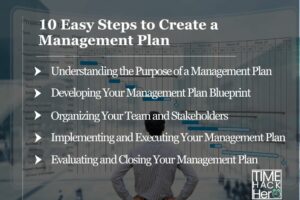In today’s competitive job market, showcasing your time management skills is crucial to landing that dream job. Employers are always on the lookout for candidates who can efficiently manage their time and prioritize tasks. To gauge your time management abilities, interviewers often ask a range of questions related to this important skill. In this article, we’ll go through 50 Time Management Interview Questions (With Example Answers) to help you do just that.
These questions will not only give you a better understanding of your own time management capabilities but also prepare you for any curveballs that might be thrown during an interview. From general organizational techniques to your ability to deal with stressful situations and juggle multiple tasks at once, these questions will cover it all, giving you a solid foundation in answering time management-related queries confidently.
By familiarizing yourself with the questions and example answers provided, you’ll be able to articulate your own time management proficiency in a precise and convincing manner. This will help you stand out in the eyes of hiring managers and increase your chances of landing that coveted management role.
Table of Contents
The Importance of Time Management in Interviews
Significance of Time Management Skills for Candidates
Time management is a crucial skill that interviewers look for in candidates. Your ability to manage your time efficiently demonstrates your organizational skills, prioritization, and work ethic. By effectively showcasing your time management skills during the interview, you can position yourself as a valuable candidate who can meet performance goals and contribute positively to the organization.
To excel in your interview, consider the following tips:
- Be punctual: Arriving on time or early for your interview shows your commitment to punctuality and respect for the interviewer’s time.
- Prepare beforehand: Research the company and role, gather relevant documents, and rehearse your answers to anticipated questions, so you can effectively manage your time during the interview.
- Demonstrate prioritization skills: Highlight specific examples from your previous experiences where you successfully juggled multiple tasks, deadlines, or projects. Explain how you determined priorities and allocated your time accordingly.
Relation Between Time Management and Job Performance
Effective time management is directly linked to job performance. As an employee, your ability to manage your time well can lead to increased productivity and more efficient work overall. Conversely, poor time management can result in missed deadlines, workplace stress, and lower performance.
Emphasize these points during your interview to showcase the benefits of your time management skills for the potential employer:
- Improved productivity: Discuss how you have used time management techniques (e.g., setting goals, prioritizing tasks, and using tools/apps) to boost productivity.
- Meeting deadlines: Share instances when you faced tight deadlines and explain how time management helped you complete your tasks on time without compromising quality.
- Reduced stress: Explain how managing your time effectively helps you maintain a balanced work-life, reducing stress levels and enhancing overall job satisfaction.
By highlighting the importance of time management in interviews and linking it to your potential job performance, you can better showcase your skills and convince interviewers that you’re an ideal candidate for the position.
Techniques and Strategies for Answering Time Management Questions
Using the STAR Method
When answering time management questions, use the STAR method to structure your responses: Situation, Task, Action, and Result. Describe a specific situation where you had to manage your time effectively, explain the tasks involved, detail the actions you took to complete those tasks, and discuss the positive results achieved. This method helps highlight your time management skills and provides employers with clear examples of your abilities.
Showcasing Your Strengths and Weaknesses
It’s essential to showcase your strengths in time management during the interview, such as prioritization, organization, and effective communication. Use examples from your past experiences to demonstrate these qualities – whether from work, school, or personal projects. When discussing your weaknesses, show that you’re aware of them and actively working on improvement. For instance, if your greatest weakness is becoming overwhelmed during busy periods, discuss the steps you’re taking to keep track of responsibilities and manage stress.
Discussing Past Work Experience
Your past work experience plays a critical role in showcasing your time management skills. When answering interview questions, provide examples of projects you’ve successfully completed, emphasizing how you effectively managed time constraints and competing priorities. Remember to highlight instances of teamwork and how your time management abilities contributed to the team’s success.
Discussing your emotional intelligence is also important when talking about past experiences. Explain how you’ve used empathy, self-awareness, and self-regulation to stay organized and manage your time effectively, even in high-pressure situations.
Here are some formatting tips for structuring your responses:
- Use bullet points to list key strengths, weaknesses, or steps taken in managing time.
- Create a table to compare and contrast different time management techniques.
- Use bold text to emphasize essential points and keywords.
Remember, keep your responses concise and focused on relevant information. Use a confident, knowledgeable, neutral, and clear tone of voice, and use second-person language (you, your, yours) throughout the interview.
50 Time Management Interview Questions (With Example Answers)
1. How do you prioritize your tasks and manage your time effectively?
Example Answer: I prioritize my tasks by evaluating their urgency and importance. I use techniques like the Eisenhower Matrix to categorize tasks into four quadrants: urgent and important, important but not urgent, urgent but not important, and not urgent nor important. This helps me focus on tasks that have the highest impact and need immediate attention.
2. Can you describe a time when you had to juggle multiple projects with tight deadlines? How did you handle it?
Example Answer: In my previous role, I faced a situation where I had to manage multiple projects with tight deadlines. I handled it by first creating a detailed project plan that outlined the tasks, milestones, and deadlines for each project. I communicated with the team members and stakeholders to ensure everyone was aware of the timelines and expectations. I also prioritized tasks based on their importance and used time management techniques like time blocking to allocate dedicated time for each project. By staying organized and proactive in managing the projects, I was able to meet all the deadlines successfully.
3. How do you handle interruptions or unexpected changes in your schedule?
Example Answer: I understand that interruptions and unexpected changes are a part of the work environment. When faced with interruptions, I assess their urgency and impact on my current tasks. If the interruption requires immediate attention, I address it promptly. Otherwise, I make a note of it and schedule a specific time to address it later. I try to minimize distractions by creating a focused work environment and practicing good communication skills to manage any changes effectively.
4. How do you stay motivated and focused on tasks, especially during challenging or monotonous projects?
Example Answer: To stay motivated, I break down tasks into smaller, manageable chunks. I set specific goals and reward myself upon their completion. I also find ways to make tasks more engaging and enjoyable by exploring different approaches or seeking opportunities for creativity. Additionally, I remind myself of the bigger picture and the impact my work will have, which helps me stay focused and motivated even during challenging or monotonous projects.
5. How do you handle tight deadlines and ensure timely completion of tasks?
Example Answer: When faced with tight deadlines, I start by assessing the requirements and breaking down the tasks into smaller, manageable parts. I create a detailed schedule, allocate sufficient time for each task, and closely monitor my progress. If needed, I leverage time-saving techniques like automation or delegation to ensure timely completion. Regular communication with stakeholders and proactive problem-solving help me stay on track and meet the deadlines.
6. How do you effectively plan your day to maximize productivity?
Example Answer: I begin my day by reviewing my task list and identifying high-priority items. I schedule dedicated time blocks for focused work, allowing minimal interruptions. I also prioritize tasks that align with my long-term goals or have approaching deadlines. By planning my day in advance and setting realistic expectations, I can maintain a productive workflow and accomplish more.
7. How do you handle competing priorities when multiple tasks require your attention?
Example Answer: When faced with competing priorities, I first assess the importance and urgency of each task. I communicate with stakeholders to gain clarity on their expectations and deadlines. If possible, I negotiate deadlines or propose alternative solutions to manage conflicting priorities effectively. I also leverage my problem-solving skills to identify potential efficiencies or delegate tasks to capable team members, ensuring all priorities are addressed promptly.
8. How do you maintain focus and manage distractions in a fast-paced work environment?
Example Answer: In a fast-paced work environment, I proactively manage distractions by creating a dedicated workspace and implementing strategies like time blocking. I turn off unnecessary notifications and set specific times for email checking to minimize interruptions. Additionally, I practice active communication with colleagues, setting boundaries when needed, and seeking their support in maintaining a focused work environment.
9. How do you handle tasks that require a significant amount of time and effort to complete?
Example Answer: For tasks that require a substantial investment of time and effort, I break them down into smaller subtasks. I create a timeline with realistic milestones and allocate dedicated time for each subtask. By dividing the work into manageable parts, I can track my progress and maintain momentum throughout the project. Additionally, I leverage time management tools and techniques to optimize efficiency and ensure timely completion.
10. How do you stay organized and keep track of deadlines and important dates?
Example Answer: I utilize various tools and techniques to stay organized and track deadlines. I maintain a digital or physical planner where I record tasks, deadlines, and important dates. I set reminders and alerts to ensure I don’t miss any key deadlines. Additionally, I regularly review and update my task list to stay on top of my commitments. By staying organized and proactive, I can effectively manage my time and meet all necessary deadlines.
11. How do you handle a situation when you feel overwhelmed with tasks and deadlines?
Example Answer: When feeling overwhelmed, I first take a step back to assess the situation. I prioritize tasks based on their urgency and importance. If needed, I reach out to my supervisor or team members to seek support or discuss workload redistribution. I break down complex tasks into smaller, more manageable parts, focusing on one task at a time. I also practice self-care techniques like taking short breaks, practicing mindfulness, or engaging in physical activity to refresh my mind and regain focus.
12. How do you ensure effective communication and collaboration with team members to manage time collectively?
Example Answer: Effective communication and collaboration are essential for managing time collectively. I ensure team members have a clear understanding of project goals, timelines, and individual responsibilities. I schedule regular check-ins or stand-up meetings to discuss progress, address any challenges, and ensure alignment. By maintaining open lines of communication, we can identify and resolve any time-related issues collaboratively.
13. How do you continuously improve your time management skills?
Example Answer: I believe in continuous improvement and regularly seek ways to enhance my time management skills. I stay updated with the latest productivity tools and techniques and explore new methodologies. I actively seek feedback from supervisors or colleagues to identify areas for improvement. Additionally, I set personal goals for enhancing my time management skills and dedicate time for self-learning and development.
14. How do you handle unexpected delays or setbacks in your projects?
Example Answer: When faced with unexpected delays or setbacks, I first assess the situation to determine the cause and impact on the project timeline. I communicate promptly with relevant stakeholders, informing them of the situation and discussing possible solutions. I then evaluate the available resources and adjust the project plan accordingly, reallocating tasks or extending deadlines if necessary. By being proactive and adaptable, I minimize the impact of setbacks on the overall project timeline.
15. Can you describe a time when you had to multitask effectively to meet deadlines?
Example Answer: In my previous role, I encountered a situation where I had to manage multiple projects simultaneously with overlapping deadlines. To multitask effectively, I first prioritized tasks based on their urgency and importance. I utilized time management techniques like time blocking to allocate dedicated time for each project. I also practiced efficient task switching, ensuring I maintained focus and momentum when transitioning between tasks. By effectively managing my workload and staying organized, I met all the deadlines successfully.
16. How do you handle procrastination and ensure timely completion of tasks?
Example Answer: I understand the negative impact of procrastination on productivity. To overcome it, I break down tasks into smaller, actionable steps. I set realistic deadlines for each step and hold myself accountable to meet them. I also eliminate distractions by creating a conducive work environment and practicing techniques like the Pomodoro Technique, where I work in focused bursts with short breaks in between. By acknowledging the tendency to procrastinate and implementing strategies to combat it, I ensure timely completion of tasks.
17. How do you delegate tasks effectively to ensure efficient use of time and resources?
Example Answer: Delegating tasks effectively requires clear communication, understanding team members’ strengths, and trusting their capabilities. I assess the workload and identify tasks suitable for delegation. I communicate the expectations, deadlines, and provide necessary guidance to the team member involved. I also maintain an open line of communication, offering support and addressing any questions or concerns that arise. By delegating tasks strategically and empowering team members, I maximize the efficient use of time and resources.
18. Can you share an example of a time when you had to make adjustments to your time management approach to accommodate changing priorities?
Example Answer: In a recent project, there was a sudden shift in priorities due to a client’s request for additional features. To accommodate the change, I evaluated the impact on existing tasks and communicated with the team to reallocate resources and adjust the project plan. I reorganized the task sequence, reprioritized deliverables, and revised the timeline accordingly. By adapting my time management approach to accommodate changing priorities, I ensured the successful delivery of the enhanced project.
19. How do you handle tight deadlines without compromising the quality of your work?
Example Answer: When faced with tight deadlines, I prioritize my tasks and focus on essential elements to ensure quality. I break down the project into manageable stages and allocate sufficient time for each phase. I also leverage my attention to detail and organizational skills to streamline processes and eliminate unnecessary steps. By maintaining open lines of communication with stakeholders and managing expectations, I can deliver high-quality work within the given time constraints.
20. How do you handle time-sensitive tasks that require immediate attention?
Example Answer: When dealing with time-sensitive tasks, I remain calm and assess the situation quickly. I determine the critical actions needed and prioritize accordingly. I communicate with relevant parties, ensuring they are aware of the urgency and the impact on other tasks. If necessary, I reallocate resources or seek assistance to ensure the timely completion of the task. By being proactive and efficient in my decision-making, I can effectively manage time-sensitive situations.
21. How do you balance long-term projects with daily responsibilities and deadlines?
Example Answer: Balancing long-term projects with daily responsibilities requires effective planning and organization. I create a comprehensive project plan with milestones and deadlines to track progress. I break down the project into smaller tasks and allocate specific time blocks for each. Additionally, I prioritize daily responsibilities based on urgency and importance. By managing my time and resources effectively, I can work on long-term projects while meeting daily deadlines and responsibilities.
22. How do you handle conflicting priorities from different stakeholders or team members?
Example Answer: When faced with conflicting priorities, I initiate open and transparent communication. I schedule meetings or discussions to understand the perspectives and expectations of all stakeholders involved. I aim to find common ground and explore possible compromises. If necessary, I escalate the issue to higher management for guidance or make recommendations based on the impact and importance of each priority. By fostering collaboration and seeking win-win solutions, I can effectively manage conflicting priorities.
23. How do you ensure a healthy work-life balance while managing your time effectively at work?
Example Answer: Maintaining a healthy work-life balance is crucial for personal well-being and productivity. To achieve this, I set boundaries and establish clear work hours. I prioritize tasks and optimize productivity during designated work time. I also make time for self-care activities, hobbies, and spending quality time with family and friends outside of work. By creating a balance between work and personal life, I can recharge and bring renewed focus and energy to my work.
24. How do you handle interruptions and unexpected changes to your schedule?
Example Answer: When faced with interruptions or unexpected changes to my schedule, I assess the situation and determine its urgency and impact on my existing tasks. If the interruption is critical and requires immediate attention, I address it promptly. However, if it can be deferred, I communicate the need for uninterrupted time to colleagues or stakeholders and schedule a specific time to address the interruption. By managing interruptions effectively, I minimize their impact on my overall productivity and time management.
25. How do you prioritize tasks when faced with a heavy workload?
Example Answer: When faced with a heavy workload, I prioritize tasks based on their deadlines, importance, and impact on project goals. I start by identifying critical tasks that require immediate attention and tackle them first. Then, I assess tasks that contribute to long-term objectives and allocate time accordingly. I also consider dependencies and interrelated tasks to ensure smooth workflow. By prioritizing tasks strategically, I can manage a heavy workload effectively and meet deadlines.
26. How do you stay motivated and maintain productivity during challenging or monotonous tasks?
Example Answer: To stay motivated during challenging or monotonous tasks, I break them down into smaller milestones and set specific goals for each milestone. I create a reward system, where I reward myself upon achieving each milestone, to maintain motivation. Additionally, I leverage time management techniques like the Pomodoro Technique, where I work in focused bursts with short breaks in between, to keep my energy levels up and stay productive. By adopting these strategies, I can maintain motivation and productivity even during challenging or monotonous tasks.
27. How do you handle tasks that require a collaborative effort and coordination with team members?
Example Answer: When handling tasks that require collaboration, I ensure clear communication and establish open lines of dialogue with team members. I set clear expectations, define roles and responsibilities, and establish deadlines for each team member. I schedule regular check-ins to discuss progress, address any challenges, and ensure coordination. By fostering effective collaboration and maintaining clear communication, we can work efficiently as a team and accomplish tasks within the designated timeframes.
28. How do you evaluate the effectiveness of your time management strategies?
Example Answer: I regularly evaluate the effectiveness of my time management strategies by assessing the outcomes and results of my work. I reflect on my productivity levels, the ability to meet deadlines, and the quality of work delivered. I also seek feedback from supervisors or colleagues on my time management skills and areas for improvement. Additionally, I compare my current practices with new techniques or tools in the field of time management and make adjustments as needed to enhance my efficiency and effectiveness.
29. How do you handle conflicting deadlines and prioritize tasks effectively?
Example Answer: When faced with conflicting deadlines, I assess the urgency and importance of each task. I communicate with stakeholders involved to gain clarity on priorities and deadlines. I then prioritize tasks based on their impact on project goals, deadlines, and dependencies. If necessary, I negotiate deadlines or reallocate resources to ensure the timely completion of critical tasks. By effectively prioritizing tasks and managing conflicting deadlines, I can meet project requirements without compromising quality.
30. How do you handle distractions and maintain focus on your tasks?
Example Answer: To handle distractions and maintain focus, I employ several strategies. First, I create a dedicated and clutter-free workspace where I can minimize external disruptions. I turn off notifications on my devices to avoid constant interruptions. I also practice time blocking, where I allocate specific time slots for different tasks and eliminate any non-essential activities during those periods. By setting clear boundaries and implementing strategies to minimize distractions, I can maintain focus and productivity.
31. How do you handle last-minute changes or requests from clients or stakeholders?
Example Answer: When faced with last-minute changes or requests, I remain flexible and adaptable. I assess the impact of the change on existing tasks and deadlines. I communicate promptly with clients or stakeholders to gather additional information and discuss the feasibility of the request. If necessary, I negotiate timelines or reallocate resources to accommodate the changes while ensuring minimal disruption to the overall project plan. By being responsive and proactive, I can effectively handle last-minute changes and meet client or stakeholder expectations.
32. How do you ensure effective communication and collaboration with remote or virtual teams?
Example Answer: Effective communication and collaboration with remote or virtual teams are crucial for successful time management. I utilize digital communication tools and platforms to facilitate real-time communication and information sharing. I schedule regular video meetings or conference calls to discuss project progress, address concerns, and maintain alignment. I also leverage project management software or collaboration tools to track tasks and deadlines, ensuring everyone has visibility into the project timeline. By leveraging technology and maintaining open lines of communication, I foster effective collaboration with remote teams.
33. How do you balance long-term goals with short-term priorities in your time management approach?
Example Answer: Balancing long-term goals with short-term priorities requires a strategic approach. I establish clear long-term goals and break them down into actionable steps or milestones. I then prioritize short-term tasks and allocate dedicated time to work on them while keeping the bigger picture in mind. I regularly review and adjust my task list to ensure alignment with long-term goals. By finding a balance between immediate priorities and long-term objectives, I can stay focused on achieving both in a timely manner.
34. How do you handle procrastination and ensure timely completion of tasks?
Example Answer: To overcome procrastination, I use several strategies. First, I break down tasks into smaller, manageable steps, which makes them less overwhelming. I set specific deadlines for each step and hold myself accountable to meet those deadlines. I also eliminate distractions by creating a focused work environment and utilizing productivity tools to block time-wasting websites or apps. By adopting these strategies and maintaining self-discipline, I can avoid procrastination and complete tasks in a timely manner.
35. How do you handle situations when unexpected tasks or emergencies arise?
Example Answer: When unexpected tasks or emergencies arise, I remain flexible and adjust my priorities accordingly. I assess the urgency and importance of the new task or emergency and evaluate its impact on existing deadlines. If necessary, I communicate with stakeholders involved to renegotiate timelines or seek assistance. I also make use of time buffers in my schedule to accommodate unforeseen circumstances. By staying adaptable and responsive, I can effectively manage unexpected tasks or emergencies without compromising overall productivity.
36. How do you delegate tasks to team members while ensuring efficient time management?
Example Answer: Delegating tasks is a crucial aspect of time management. When delegating, I consider the skills and strengths of each team member and match tasks accordingly. I clearly communicate expectations, deadlines, and desired outcomes. I provide necessary support and resources to empower team members to complete their tasks effectively. Throughout the process, I maintain open lines of communication, provide feedback and guidance when needed, and monitor progress. By effectively delegating tasks, I can leverage the strengths of my team and achieve efficient time management.
37. How do you stay organized and keep track of multiple projects simultaneously?
Example Answer: To stay organized and manage multiple projects, I utilize project management tools and techniques. I create project timelines with clear milestones, deadlines, and dependencies. I break down projects into smaller tasks and allocate time for each task. I maintain a centralized system to track progress, prioritize tasks, and monitor deadlines. I also schedule regular check-ins with project teams to ensure alignment and address any issues promptly. By implementing effective organizational systems, I can successfully manage multiple projects simultaneously.
38. How do you ensure continuous improvement in your time management skills?
Example Answer: I believe in the importance of continuous improvement in time management skills. I regularly reflect on my performance and identify areas for growth. I seek feedback from supervisors, colleagues, or mentors to gain different perspectives and insights. I stay updated with the latest time management techniques and tools through reading books, attending seminars, or taking online courses. I experiment with new approaches and evaluate their effectiveness. By actively seeking opportunities to improve, I can enhance my time management skills and increase productivity.
39. How do you handle competing priorities and deadlines from different stakeholders?
Example Answer: When faced with competing priorities and deadlines, I prioritize tasks based on their alignment with organizational goals and the impact they have on key stakeholders. I proactively communicate with stakeholders, clearly outlining the available resources and timelines. I negotiate deadlines when necessary, ensuring a realistic and feasible schedule. I also identify opportunities for delegation or collaboration to effectively manage multiple priorities. By balancing the needs of different stakeholders and effectively prioritizing tasks, I can meet deadlines and deliver results.
40. How do you manage your energy levels throughout the day to maintain productivity?
Example Answer: Managing energy levels is crucial for maintaining productivity. I prioritize self-care and ensure I get enough sleep, exercise regularly, and maintain a healthy diet. I leverage the power of breaks by incorporating short rest periods throughout the day to recharge. I also align my most challenging or important tasks with periods when I have the highest energy levels. By managing my energy effectively, I can maintain focus, sustain productivity, and deliver high-quality work consistently.
41. How do you handle time-sensitive tasks that require immediate attention?
Example Answer: When faced with time-sensitive tasks, I follow a structured approach. First, I assess the urgency and impact of the task to determine its priority level. I allocate dedicated time to address it, ensuring minimal disruptions. I also communicate with relevant stakeholders to align expectations and deadlines. If necessary, I reprioritize or delegate other tasks to create space for immediate attention. By managing time-sensitive tasks efficiently, I can meet deadlines and deliver quality results in a timely manner.
42. How do you balance your own workload with supporting others who may require your assistance?
Example Answer: Balancing my workload with supporting others is a delicate task. I practice effective time blocking, allocating specific time slots for my own tasks and availability for others. I communicate my availability and set clear boundaries to manage expectations. I proactively assess the urgency and importance of requests for assistance, prioritizing them based on their impact on overall goals. I also collaborate with colleagues to find solutions that minimize the impact on everyone’s workload. By finding a balance between personal tasks and supporting others, I can contribute effectively to the team’s success.
43. How do you handle unexpected delays or setbacks that affect your project timeline?
Example Answer: Unexpected delays or setbacks are inevitable in project management. When they occur, I assess the situation, identify the root cause, and communicate with stakeholders about the impact on the project timeline. I work closely with team members to develop alternative plans or adjust resources to minimize the impact. I also ensure that lessons learned from the setback are captured and applied to future projects to prevent similar issues. By adopting a proactive and solution-oriented approach, I can mitigate the effects of delays or setbacks and keep the project on track.
44. How do you handle interruptions and unexpected disruptions during your workday?
Example Answer: Interruptions and unexpected disruptions are common in the workplace. To handle them effectively, I prioritize tasks and allocate focused time blocks for important activities. When interruptions occur, I assess their urgency and importance. If they require immediate attention, I address them quickly and return to my previous task. If they can be deferred, I communicate the need for uninterrupted time and schedule a specific time to address them later. By managing interruptions and staying focused on my priorities, I can minimize the impact on my productivity.
45. How do you ensure effective collaboration and coordination with cross-functional teams?
Example Answer: Effective collaboration and coordination with cross-functional teams are essential for successful time management. I establish open lines of communication, ensuring regular meetings and status updates. I clarify roles, responsibilities, and expectations to avoid misunderstandings and streamline workflows. I utilize project management tools or collaboration platforms to track progress, assign tasks, and monitor deadlines. I also actively listen to team members’ input and provide support when needed. By fostering a collaborative environment and promoting effective communication, I can ensure smooth coordination among cross-functional teams.
46. How do you handle multitasking and prioritize tasks when faced with a heavy workload?
Example Answer: When faced with a heavy workload, I prioritize tasks using the Eisenhower Matrix or similar prioritization techniques. I identify high-priority and high-impact tasks that align with organizational goals. I break down complex projects into smaller, manageable tasks and set realistic deadlines. I delegate tasks when appropriate and collaborate with team members to ensure efficient task distribution. I also practice time blocking, allocating dedicated time slots for specific tasks. By managing multitasking effectively and focusing on priority tasks, I can maintain productivity and meet deadlines.
47. How do you handle time management challenges when working remotely or in a flexible work environment?
Example Answer: Working remotely or in a flexible work environment requires strong time management skills. I establish a structured routine and set clear boundaries between work and personal life. I create a dedicated workspace that is free from distractions. I use productivity tools to manage tasks, set reminders, and track progress. I communicate regularly with team members and managers to maintain alignment and stay accountable. I also proactively manage my energy levels by taking breaks and practicing self-care. By adapting to the unique challenges of remote work, I can effectively manage my time and deliver results.
48. How do you measure your own time management effectiveness and make improvements?
Example Answer: To measure my time management effectiveness, I regularly evaluate my performance against set goals and deadlines. I review completed tasks and projects, assessing whether they were delivered on time and met the desired quality standards. I also seek feedback from colleagues or supervisors on my time management skills. Additionally, I track key performance indicators, such as productivity levels and task completion rates. Based on these assessments, I identify areas for improvement and develop strategies to enhance my time management practices. By actively monitoring and improving my time management effectiveness, I can continually enhance my productivity and efficiency.
49. How do you handle conflicting priorities when multiple projects require your attention?
Example Answer: When faced with conflicting priorities, I first assess the urgency, importance, and impact of each project. I communicate with project stakeholders to gain a clear understanding of their expectations and deadlines. I then create a priority matrix to determine which projects require immediate attention and which can be scheduled accordingly. If necessary, I negotiate deadlines or reallocate resources to balance the workload. By effectively managing conflicting priorities, I can ensure that each project receives the necessary attention and is completed on time.
50. How do you manage your time during periods of high stress or tight deadlines?
Example Answer: During periods of high stress or tight deadlines, I remain calm and focused by utilizing proven time management techniques. I break down tasks into smaller, actionable steps and create a detailed schedule. I set realistic deadlines for each task and allocate buffer time to account for unexpected challenges. I prioritize tasks based on their urgency and impact. I also practice self-care by taking short breaks, engaging in stress-relieving activities, and maintaining a healthy work-life balance. By managing my time effectively during high-stress periods, I can maintain productivity and deliver quality results.
Conclusion
As you can see, time management is a vital skill that employers often seek during interviews. By mastering these 50 time management interview questions and their example answers, you can demonstrate your own ability to manage time effectively and stay organized in various work situations.
Remember to focus on specific examples from your own experience, showcasing how you prioritize tasks, delegate responsibilities, and meet deadlines while keeping an eye on quality and efficiency. Use real-life situations to provide context for the interviewer, illustrating your skills in action.
Practice makes perfect – rehearse your answers to these questions ahead of time, so you can respond confidently and eloquently during the interview process. As you do so, make sure to stay genuine in your responses, avoiding exaggerations or false claims, to maintain your integrity and credibility.
In the end, by understanding how to address these time management questions and providing effective example answers, you will significantly improve your chances of impressing potential employers and landing that dream job. Good luck and may your exceptional time management skills help you excel in the workplace!









